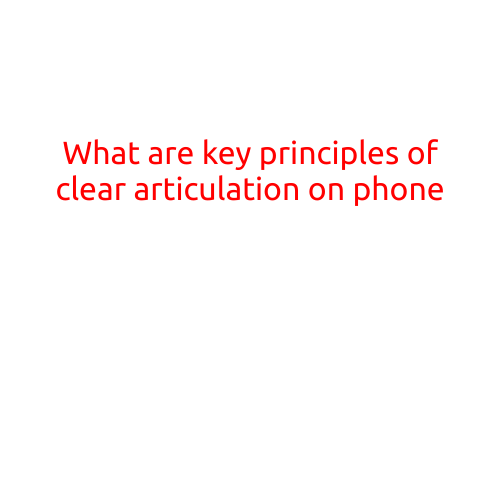
What are the Key Principles of Clear Articulation on Phone?
In today’s digital age, phone calls have become an essential means of communication, whether it’s for personal or professional purposes. However, poor articulation can lead to misunderstandings, miscommunications, and frustration. Clear articulation on the phone is crucial to ensure that your message is conveyed effectively and efficiently. But what are the key principles of clear articulation on phone? In this article, we’ll explore some essential tips to help you improve your phone call communication skills.
1. Speak Clearly and Concisely
When speaking on the phone, make sure to enunciate your words clearly and concisely. Avoid mumbling, slurring, or rushing through your words, as this can lead to confusion and misunderstandings. Speak at a moderate pace, pausing briefly between sentences to allow the listener to process the information.
2. Project Your Voice
When speaking on the phone, it’s essential to project your voice to ensure that your words are heard clearly at the other end. Avoid speaking in a low, nasally tone, which can be difficult for listeners to understand. Instead, speak in a mid-range tone that resonates through the phone.
3. Use Proper Pronunciation
Proper pronunciation is vital when speaking on the phone. Practice correct pronunciation of words, pay attention to syllable stress, and avoid using slang or colloquialisms that may be unfamiliar to the listener.
4. Pause Between Sentences
Pausing between sentences helps the listener process the information and allows for better comprehension. Take a brief pause between sentences to ensure that the listener has time to absorb what you’re saying.
5. Minimize Background Noise
Background noise can be distracting and affect the clarity of your speech. Ensure that you’re in a quiet, distraction-free environment when making phone calls. If you’re in a noisy area, consider moving to a quieter location or using noise-cancelling headphones.
6. Use a Phone with Good Audio Quality
The quality of your phone’s audio can significantly affect the clarity of your speech. Use a phone with good audio quality, such as a smartphone or a landline phone with a high-quality speakerphone.
7. Practice Active Listening
Active listening is equally important as clear articulation on phone. Pay attention to the listener and respond thoughtfully to their questions. Avoid interrupting or talking over the other person, as this can create misunderstandings and frustrations.
8. Use Visual Cues
Visual cues, such as gestures and facial expressions, can help convey your message more effectively on phone calls. Use humor, emphasis, and tone of voice to convey your emotions and add context to your words.
9. Avoid Distractions
Avoid distractions when making phone calls, such as multitasking, watching TV, or browsing the internet. Give the listener your undivided attention to ensure that your message is conveyed effectively.
10. Take Notes
Taking notes during phone calls can help you ensure that you remember important details and follow up on discussions. Write down key points, action items, and questions to ask the listener.
In conclusion, clear articulation on phone is crucial for effective communication. By following these key principles, you can improve your phone call communication skills, reduce misunderstandings, and convey your message more effectively. Remember to speak clearly and concisely, project your voice, use proper pronunciation, and minimize background noise. Practice active listening, use visual cues, avoid distractions, and take notes to ensure that your phone calls are productive and successful.





